
Julia Agrippina, also referred to as Agrippina the Younger, was Roman empress from AD 49 to 54, the fourth wife and niece of emperor Claudius, and the mother of Nero.

Tiberius Claudius Caesar Augustus Germanicus was a Roman emperor, ruling from AD 41 to 54. A member of the Julio-Claudian dynasty, Claudius was born to Drusus and Antonia Minor at Lugdunum in Roman Gaul, where his father was stationed as a military legate. He was the first Roman emperor to be born outside Italy.

The Tragedy of Hamlet, Prince of Denmark, often shortened to Hamlet, is a tragedy written by William Shakespeare sometime between 1599 and 1601. It is Shakespeare's longest play. Set in Denmark, the play depicts Prince Hamlet and his attempts to exact revenge against his uncle, Claudius, who has murdered Hamlet's father in order to seize his throne and marry Hamlet's mother. Hamlet is considered among the "most powerful and influential tragedies in the English language", with a story capable of "seemingly endless retelling and adaptation by others". It is widely considered one of the greatest plays of all time. Three different early versions of the play are extant: the First Quarto ; the Second Quarto ; and the First Folio. Each version includes lines and passages missing from the others.
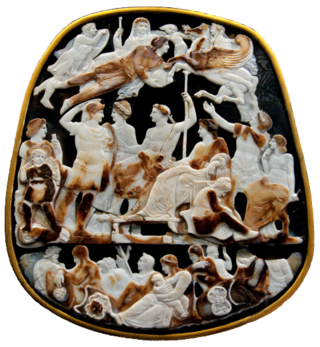
The Julio-Claudian dynasty comprised the first five Roman emperors: Augustus, Tiberius, Caligula, Claudius, and Nero.

Rosencrantz and Guildenstern Are Dead is an absurdist, existential tragicomedy by Tom Stoppard, first staged at the Edinburgh Festival Fringe in 1966. The play expands upon the exploits of two minor characters from Shakespeare's Hamlet, the courtiers Rosencrantz and Guildenstern, and the main setting is Denmark.

Herod Agrippa, also known as Herod II or Agrippa I, was the last king of Judea. He was a grandson of Herod the Great and the father of Herod Agrippa II, the last known king from the Herodian dynasty. He was an acquaintance or friend of Roman emperors and played crucial roles in internal Roman politics.
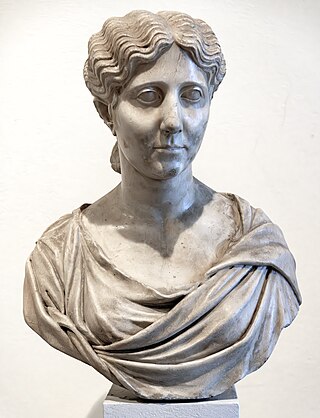
Antonia Minor was the younger of two surviving daughters of Mark Antony and Octavia Minor. She was a niece of the Emperor Augustus, sister-in-law of the Emperor Tiberius, paternal grandmother of the Emperor Caligula and Empress Agrippina the Younger, mother of the Emperor Claudius, and maternal great-grandmother of the Emperor Nero. She outlived her husband Drusus, her oldest son, her daughter, and several of her grandchildren.

Lucius Annaeus Seneca the Younger, usually known mononymously as Seneca, was a Stoic philosopher of Ancient Rome, a statesman, dramatist, and in one work, satirist, from the post-Augustan age of Latin literature.
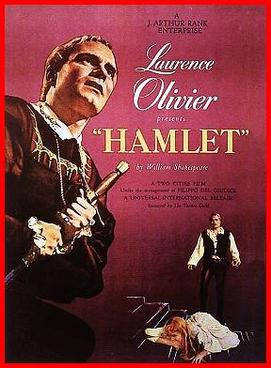
Hamlet is a 1948 British film adaptation of William Shakespeare's play of the same name, adapted and directed by and starring Laurence Olivier. Hamlet was Olivier's second film as director and the second of the three Shakespeare films that he directed. Hamlet was the first British film to win the Academy Award for Best Picture. It is the first sound film of the play in English.
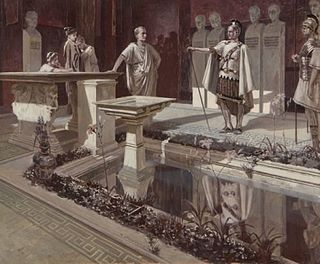
Aulus Plautius was a Roman politician and general of the mid-1st century. He began the Roman conquest of Britain in 43, and became the first governor of the new province, serving from 43 to 46.
John Percival Martin was an English author best known for his Uncle series of children's stories.
Quintus Claudius Quadrigarius was a Roman historian. Little is known of Q. Claudius Quadrigarius's life, but he probably lived in the 1st century BCE.
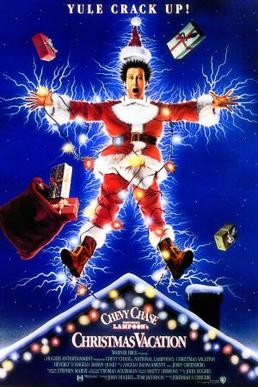
National Lampoon's Christmas Vacation is a 1989 American Christmas comedy film and the third installment in National Lampoon magazine's Vacation film series. Christmas Vacation was directed by Jeremiah S. Chechik, written and co-produced by John Hughes, and starring Chevy Chase, Beverly D'Angelo, and Randy Quaid with supporting roles by Miriam Flynn, William Hickey, Mae Questel, Diane Ladd, John Randolph, E.G. Marshall, Doris Roberts, Juliette Lewis, and Johnny Galecki.
The United States Camel Corps was a mid-19th-century experiment by the United States Army in using camels as pack animals in the Southwestern United States. Although the camels proved to be hardy and well suited to travel through the region, the Army declined to adopt them for military use. The Civil War interfered with the experiment, which was eventually abandoned; the animals were sold at auction.

King Claudius is a fictional character and the main antagonist of William Shakespeare's tragedy Hamlet. He is the brother to King Hamlet, second husband to Gertrude and uncle and later stepfather to Prince Hamlet. He obtained the throne of Denmark by murdering his brother with poison and then marrying the late king's widow. He is loosely based on the Jutish chieftain Feng who appears in Chronicon Lethrense and in Saxo Grammaticus' Gesta Danorum. There has never been an actual Danish king of that name.
ʿAmr ibn Kulthūm ibn Mālik ibn ʿAttāb ʾAbū Al-ʾAswad al-Taghlibi was a poet and chieftain of the Taghlib tribe in pre-Islamic Arabia. One of his poems was included in the Mu'allaqat. He is the grandson of the poet Abu Layla al-Muhalhel.

Hamlet, or Hamlet: The Drama of Vengeance, is a 1921 German film adaptation of the William Shakespeare play Hamlet starring and produced by Danish silent film actress Asta Nielsen. It was directed by Svend Gade and Heinz Schall. The film was shot at the Johannisthal Studios in Berlin.

Prince Hamlet is the title character and protagonist of William Shakespeare's tragedy Hamlet (1599–1601). He is the Prince of Denmark, nephew to the usurping Claudius, and son of King Hamlet, the previous King of Denmark. At the beginning of the play, he is conflicted whether, and how, to avenge the murder of his father, and struggles with his own sanity along the way. By the end of the tragedy, Hamlet has caused the deaths of Polonius, Laertes, Claudius, and Rosencrantz and Guildenstern, two acquaintances of his from childhood. He is also indirectly involved in the deaths of his love Ophelia (drowning) and of his mother Gertrude.
Over fifty films of William Shakespeare's Hamlet have been made since 1900. Seven post-war Hamlet films have had a theatrical release: Laurence Olivier's Hamlet of 1948; Grigori Kozintsev's 1964 Russian adaptation; a film of the John Gielgud-directed 1964 Broadway production, Richard Burton's Hamlet, which played limited engagements that same year; Tony Richardson's 1969 version featuring Nicol Williamson as Hamlet and Anthony Hopkins as Claudius; Franco Zeffirelli's 1990 version starring Mel Gibson; Kenneth Branagh's full-text 1996 version; and Michael Almereyda's 2000 modernisation, starring Ethan Hawke.

National Lampoon's Vacation film series is a comedy film series initially based on John Hughes' short story "Vacation '58" that was originally published by National Lampoon magazine. The series is distributed by Warner Bros. and consists of five main films, two of which are not sponsored by National Lampoon, and one spin-off. In recent years, the series has been the inspiration for various advertising campaigns featuring some of the original cast members. The series portrays the misadventures of the Griswold family, and in particular family patriarch Clark Griswold - whose well meaning attempts to provide his family and children with the perfect vacation continually go awry in spectacular fashion, landing them in the middle of various disasters and strangely embarrassing predicaments.














